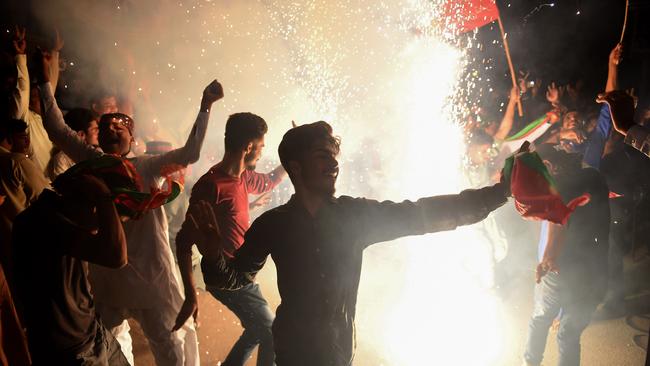For Imran Khan, Winning Was the Easy Part
Imran Khan has promised much on his long road to power. Now comes the hard part of delivering.

As widely expected, Khan’s Pakistan Tehreek-e-Insaf party (PTI) defeated the incumbent Pakistan Muslim League-Nawaz of jailed former prime minister Nawaz Sharif. By holding on to its stronghold of Khyber-Pakhtunkhwa in the northwest and making deep inroads in populous Punjab province, PTI won 109 of the 272 directly elected seats to the lower house of Parliament.
The PML-N won 61 seats, less than half of its total five years ago. The leftist Pakistan Peoples Party, the political vehicle of the once-powerful Bhutto clan, was third with 39 seats. PTI should easily form a government with the help of smaller parties and independents.
For Khan’s elated supporters, his election to an office he has sought for more than two decades marks the end of politics as usual in Pakistan.
The former cricket star has promised corruption-free governance, a welfare state modelled on Islamic principles that he says were borrowed by countries such as Sweden, and an end to Pakistan’s “slavish” subservience to the US.
In reality, the result marks a step backward for the nuclear-armed nation.
Thanks to heavy-handed efforts by the powerful army to tilt the political playing field in his favour, Khan takes office with his legitimacy under a cloud. PML-N president Shehbaz Sharif, the outgoing chief minister of Punjab and younger brother of the jailed former prime minister, tweeted that his party “wholly rejects” the results.
The younger Sharif and PPP leader Bilawal Bhutto Zardari have raised allegations of rigging. They accuse the National Election Commission of illegally evicting their parties’ election agents from polling stations. The commission denies wrongdoing and blames software glitches for delays in announcing official results. We can dismiss some of these opposition complaints as the usual sour grapes following a defeat, but in an environment where Khan already stands accused of colluding with the army to hobble his rivals, they will add to his legitimacy deficit.
Last year, the Supreme Court made Nawaz Sharif step down as prime minister for not meeting vaguely worded Islamic injunctions to be “truthful and trustworthy”. Earlier this month, an anti-corruption court sentenced Sharif and his daughter Maryam Nawaz Sharif to jail for failing to show convincingly how the family came to own four luxury apartments in an upscale London neighbourhood.
Many independent observers see the army’s influence at work in the judiciary’s zeal to punish the Sharifs.
The new government also will struggle to shape a national consensus. Khan has long taken a confrontational approach towards his rivals, treating them as corrupt oligarchs unfit for high office rather than as legitimate politicians with their own networks of loyal supporters.
PTI spokesman Naeem ul Haque called the national election “a contest between the forces of good and evil”.
Many Pakistanis disagree. The PML-N retains deep reserves of support in Punjab, where it may again form the provincial government. The PPP still dominates in Sindh. Both parties will likely resist any attempts to roll back provincial autonomy or synthetically engineer further support for Khan.
Moreover, although the army may have cowed much of Pakistan’s media in the run-up to the vote, it has not been able to tame it entirely. Thanks to a handful of plucky newspaper publishers, a clutch of professional journalists, an active Pakistani intelligentsia in the West and the explosion of social media, it will be virtually impossible to quash all dissent.
Khan also will have to find a way to square his irresponsible rhetoric with reality.
His habit of blaming the US for Pakistan’s terrorism problem may please the generals and a chorus of Twitter trolls but as long as Pakistan shelters terrorist groups such as the Afghan Taliban, the Haqqani network and Lashkar-e-Taiba, restoring its standing in the world will be a struggle.
The gauzy promise of an Islamic welfare state stands on equally shaky ground. The rupee has lost 15 per cent of its value against the dollar since December, and foreign-exchange reserves are barely enough to pay for six weeks of imports. Moreover, Khan’s friends in the army, used to lavish military budgets, are the biggest impediment to stepped-up spending on health and education.
Khan has promised much on his long road to power. Now comes the hard part of delivering.
The Wall Street Journal



With Imran Khan’s victory in Wednesday’s election, Pakistan will get its fifth prime minister in seven years. Instead of providing a sorely needed spell of political stability, the contentious election signals more turmoil.